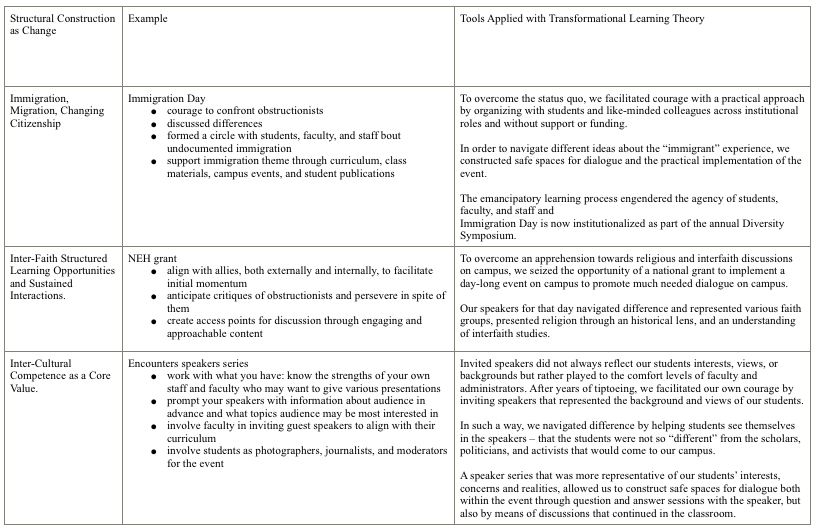Specifically, we identified four tools required for the kind of institutional transformation that we have heard and read professionals in higher education desire to see for civic learning and democratic engagement. These are presented below:
- Practicing Courage: In the face of obstacles, finding allies, pooling resources, and blazing new trails with or without support.
- Navigating Difference: To create the democratic community we seek, we recognized the need to achieve a collaboration between curricular and co-curricular components to create a larger sense of community and a coherent civic ethos.
- Constructing Safe Spaces for Dialogue: understand, unpack, and navigate complex identities, the roles and responsibilities that may come with them, including the code-switching or place-dependent ways that some identities dominate over others.
- Engendering Agency: Once a better understanding of identity is achieved participants are asked to contemplate their skills.
While there are a variety of factors that influence institutions outside of the institution, such as fiscal constraints, fluctuating enrollments, and the politics of globalization, we identified three structural blocks that have been stubbornly persistent and resistant to change. These three blocks involved a status quo against discussing:
- Immigration, Migration, Changing Citizenship;
- Inter-Faith Structured Learning Opportunities and Sustained Interactions;
- Inter-Cultural Competence as a Core Value.
Much has been written about the fact that any rational causal analysis is rife with difficulties. However, we rely on a triangulation approach that has been successful in analyzing social change within legal mobilization and rights consciousness studies (McCann, 1994). McCann (1994) posits, “If all existing methods of inquiry alone are intrinsically biased, and hence imperfect, then one sensible response is to rely on a variety of techniques that supplement each other.” Given the limitations, we compiled data from the following sources: documents from internal actors and those documents utilized from outside sources that were deemed important by administrators and/or faculty, our own observations, reflections, and analytical synthesis of our shared experience, and student narratives collected throughout the duration of our combined effort 2012 – 2019. We compare this to a substantial literature review about civic engagement broadly and a small literature about our institution as a way to establish a baseline for transformation.
Measurement of change consists of identifying the baseline: no change, or the status quo, as indicated in our control using the articles written by Turner (2016), Chapman (2018), and Parker (2016). Another article (Legum, 2017) expressly advocates against a change toward civic ethos:
“some members of the faculty, especially those who view the role of educator as a social reformer, try to enlighten their students as to how to ensure that society does not end up in this ‘unjust’ outcome” and “some colleges” institute a civic engagement requirement as an “additional graduation requirement.”
Finally, we record our own observations and news reports to verify our position within this no-change environment. Change is measured by what new structural developments were constructed well, much like revolution and social change studies, but also upon our observations of this change as actors within the environment. We also draw upon student responses to these changes as samples of the impact beyond one individual actor or an archived document. A summary of these changes is included in the table below; we present an elaboration of the theoretical puzzle in the section that follows.



